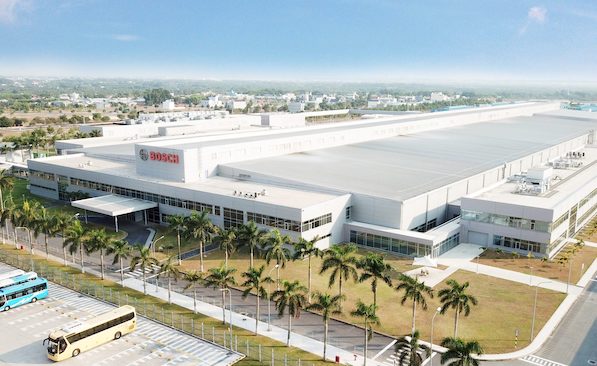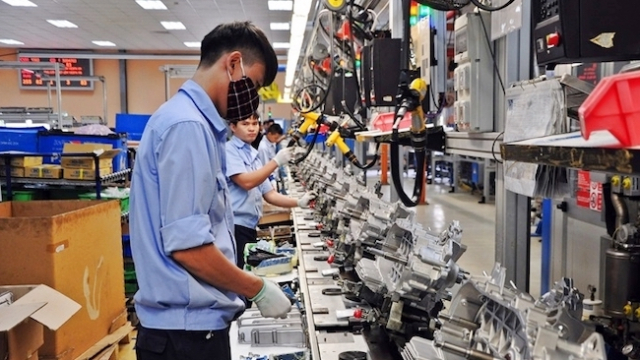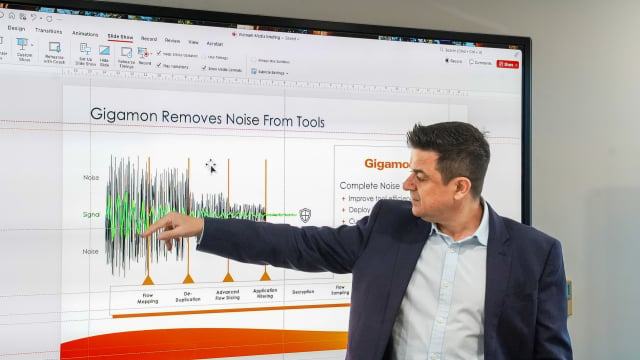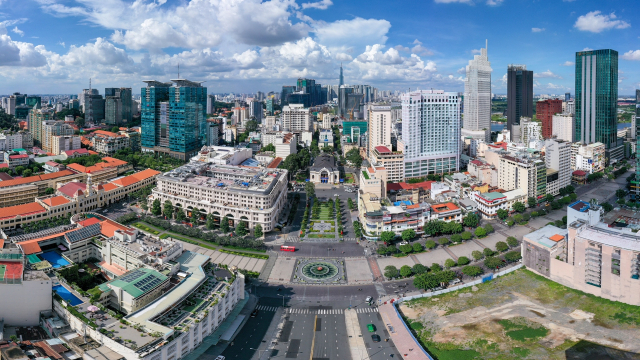Leader Talk
European enterprises see bright future in Vietnam
Many big European businesses revealed its expansion plan in Vietnam, showing that Vietnam plays a crucial part in their production and consumption markets.
Guru Mallikarjuna, managing director of Bosch Vietnam, recently revealed that the company has a roadmap for the next five years to continue its expansion plan in Vietnam, by doubling the capacity of its software center with the establishment of a new branch in Hanoi, scaling-up production footprint in Dong Nai, and establishment of a corporate office in Ho Chi Minh City.
The plan is one part of an ambition to make Southeast Asia country the leading development hub for the Bosch Global Group.
Over the last 12 years, Bosch Vietnam has grown significantly in term of presence and commitment to the country. It now employee approximately 5000 employees, operates a high-tech manufacturing plant in Dong Nai Province, two R&D centers in Ho Chi Minh city, and have offices in Hanoi, Ho Chi Minh City, and Da Nang.

In recent months, Covid-19 has brought unprecedented upheaval with serious consequences to the Vietnam’s economy and all industries within it. At Bosch Vietnam, the impact of outbreak is most obviously felt at the Bosch plant in Dong Nai, one of the biggest continuously variable transmission pushbelt production plants globally.
In support of the government’s effort in containing the pandemic, and under the guidance of Dong Nai’s People’s Committee, the plant has strictly followed the three-on-site model to maintain its operation with around 900 employees even though with numerous challenges on various aspects.
“Looking forward, the fight against Covid-19 pandemic would not be easy nor short or ended. However, Bosch Vietnam remains committed to our investment and business activities in the country,” stated he.
Sharing the same view, Decathlon Vietnam’s country director Lionel Adenot, affirmed: “There is no doubt that Vietnam is and will remain a key destination country for its production.”
Its forecasts and the production sharing allocated are showing that the growth will restart strongly in 2022 and is planned to ramp up in the coming years.
Vietnam has a large, young and qualified work force in the production industry, enabling to manufacture more and more categories of products. All these points are extremely favorable to accompany Decathlon’s future growth, he insisted.
He also revealed that the company has the ambition to become the favourite sport brand of Vietnamese people, like it is the case in France. It means opening more physical stores in the cities of Ho Chi Minh and Hanoi, but in few years also in tier 2 cities, such as Haiphong, Danang or Can Tho.

Decathlon’s Vietnamese adventure started in 1995 with two people, and now it has more than 500 teammates. It started business from scratch to reach last year a volume of 150 million, produced in Vietnam, then ship to its stores in more than 60 countries all over the world. For Decathlon, Vietnam is the second biggest source of production in the world.
The brand works with around 100 suppliers spread all over the country, from Ho Chi Minh to Hanoi, passing by Hue, Danang, Vinh, Song Tra, An Giang and many other locations.
At the beginning of 2017, it decided to launch very first retail activity in Vietnam, through an e-commerce website, and then through an activity of C&C in sport clubs, building an eco- system by city.
“It was a first step to meet our local customers and users, who gave us positive and encouraging feedback,” stated Lionel Adenot.
Step by step, this activity has grown and has convinced them that it was the right time to open a physical store. In April 2019, it opened the first Decathlon store in the capital city of Hanoi, the largest sport store in Vietnam. Since then, it has open three other stores, one more in Hanoi and two in Ho Chi Minh city.
EVFTA – golden opportunity
Speaking at Meet Europe 2021 event, Chairman of EuroCham Alain Cany, emphasized: “Now we have turned the corner in our fight against the pandemic, it is important that we focus on the future of EU – Vietnam trade and investment. Our aim is no longer just to survive, but to thrive.”
There are huge opportunities for greater partnership between Vietnam and the EU post-pandemic, as EU-Vietnam Free Trade Agreement (EVFTA), which has been in force since 2020, establishes a gradual reduction of tariffs and a mutual opening of markets unleashing a new wave of trade for both business communities.
Guru Mallikarjuna, shared his acknowledge the potential benefits of the EVFTA, which will be of even greater importance to the business community.
The first year of EVFTA implementation witnessed great efforts from the Government of Vietnam to streamlining administrative procedures, investing in public governance and the labour force’s competitiveness, and completing regulatory framework to support compliance with international standards.
These improvements in local business environment will be of great favour to European business community.
However, more work is to be done, such as the early ratification and implementation of EU-Vietnam Investment Protection (EVIPA). For German companies like Bosch, who often specialize in high-tech industries, EVIPA would make it safer and easier to scale up investments in Vietnam.
Representative of Decathlon Lionel Adenot expressed that it need the support of Vietnam’s government to make the expansion plan possible. In short term, having a fully vaccinated workers population in all factories, is a priority, and to ease the travelling restrictions for vaccinated people is crucial.
On the industrial side, an acceleration of the localization of the upstream side of the value chain is important. “We need support to encourage industrials to automatize and digitalize their activities, to gain in terms of efficiency,” said he.
On the sustainability, it need support to the biomass sector, to enhance coal substitute, still very much used in the so-called wet process such as dying or tanneries.
Lionel Adenot affirmed: “We are proud of what we have built in the past 26 years, but we are also very confident about what we will build in the next 50 years, in Vietnam.”
European business sentiment inches up as Vietnam reopens
Vietnam turns semiconductor vision into action
The global semiconductor industry is being reshaped by geopolitical tensions, shifting supply chains, and the surge of digital technologies.
Cutting red tape in APA approvals to speed up tax negotiations
The change in APA approval authority is expected to shorten processing time and enhance business proactiveness in international tax negotiations.
Enterprise cybersecurity is under threat from the inside
As hybrid cloud systems grow more complex, Vietnamese enterprises are struggling to detect cybersecurity threats moving laterally within their own networks.
Breakthrough for the international financial center ambition
The submission of the draft resolution on Vietnam’s international financial center to the National Assembly heralds a new developmental era for the country.
How leadership philosophy redefines hospitality in Nha Trang
More than just running a 5-star resort, Kristian Petersen is redefining the art of hospitality with a humane and sustainable leadership philosophy.
When organic becomes an inspiring wellbeing lifestyle
For Tyna Huynh, co-founder of Drinkizz, organic is not just a food choice but a way of life that fosters a deep connection between people, nature and community.





























![[Hỏi đáp] Hộ kinh doanh khai thuế theo tháng, quý hay năm theo dự thảo nghị định mới?](https://t.ex-cdn.com/theleader.vn/192w/files/content/2025/12/18/164220vha_5034-1641.jpg)
![[Hỏi đáp] Tạm ngừng kinh doanh, hộ kinh doanh có phải kê khai thuế?](https://t.ex-cdn.com/theleader.vn/192w/files/content/2025/12/18/163704vha_7531-1636.jpg)












